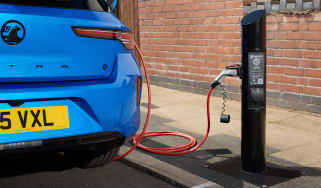Vauxhall Cascada 2.0 CDTi
We hit UK roads in the Vauxhall Cascada, as the Audi A5 Cabriolet rival arrives in showrooms

As Vauxhall bids to move itself upmarket, the Cascada is a step in the right direction. It’s not as complete a package as the Audi A5 Cabriolet, but it’s a sophisticated and capable four-seat convertible. And while it’s built for comfort rather than speed, it handles and rides well. The diesel engine isn’t the most refined, but it counters with 15.1mpg better fuel economy than the new petrol version, and the cabin feels well built. This model’s not quite good enough to justify its price tag, though.
First came the Mokka, then the Adam. Now, Vauxhall’s adventurous new naming strategy has stretched to a four-seater drop-top with the Audi A5 Cabriolet firmly in its sights. But does the Cascada have what it takes to make a name for itself in the UK?
While the Cascada is the first car to use the company’s new 1.6-litre petrol engine, our model is powered by the 2.0-litre diesel.
On paper, the two engines are evenly matched – they have the same 135mph top speed, while the petrol car is four-tenths faster from 0-60mph (setting a time of 9.2 seconds), even with an automatic gearbox.
What the figures don’t show is how 70Nm more torque (350Nm in total) gives the diesel more urgent in-gear acceleration.
Used - available now

2023 Peugeot
3008
3,796 milesAutomaticPetrol1.2L
Cash £18,697
2024 Volkswagen
Golf
41,949 milesManualPetrol1.5L
Cash £16,976
2019 Mercedes
GLE Coupe
56,587 milesAutomaticPetrol3.0L
Cash £26,999
2023 BMW
X2
53,860 milesManualDiesel2.0L
Cash £12,499Even so, neither engine is a sparkling performer. The diesel produces a lot of rattly noise, particularly at low revs. It also has a narrow powerband, not coming on boost until nearly 2,000rpm and running out of puff just below 4,000rpm. That means you have to work the six-speed box harder than you’d expect to counter the engine’s inflexibility and the Cascada’s heavy weight.
At higher speeds, the diesel quietens down and the soft-top becomes the smooth and refined cruiser it was designed to be. It has big 18-inch alloy wheels, but the ride is supple, soaking up bumps well and smoothing out all but the worst potholes.
Our car came with adaptive FlexRide adjustable dampers, which are worth considering if comfort is your priority. They allow you to choose three modes – Normal, Sport or Tour. They can also be left to their own devices to adapt to the road conditions.
The Cascada is no sports car, although it still handles pretty well and, while there’s not much steering feel, the front responds quickly and accurately. You feel the extra weight in the nose of the diesel engine compared to the petrol version, but the brakes are still more than capable.
The Cascada’s exterior mixes familiar Vauxhall Astra styling cues with the increased length of the Insignia (it uses components from both cars). It lacks the clean lines of the Audi A5 Cabriolet, which is a similar size, but it’s still attractive, if not the most eye-catching shape. The cheapest model costs £7,790 less than the Audi, too, although this top-spec car closes the gap significantly.
Inside, the centre console is a button-fest and the A-pillars hamper your view, but the driving position is decent enough.
With the roof down, the car loses little rigidity, and occupants are well protected from buffeting, as long as you keep the windows up. But tall rear seat passengers get blown about, limiting how long you can go four-up with the hood folded.


